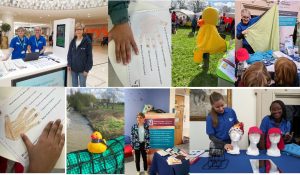June 14, 2024, by mszteh
Getting out and about with Rapid Eczema Trials
The ‘traditional route’ for publicising research is to publish the results in scientific and medical journals and talk about what’s been done at scientific conferences. This means a lot of research is only accessible to a limited audience of other researchers and healthcare professionals. But patients and the public are users of research too and we really can’t do clinical research without them! If people can access research more easily and in accessible formats, it may encourage them to take part in research more readily. It may also help them understand and manage their conditions better. This is something that’s really important for long-term conditions like eczema.
We’re trying to make sure we’re getting the message about Rapid Eczema Trials out to those living with eczema in different ways. This includes our newsletters which go out to our citizen science mailing list (now over 650 of you), social media, working with community champions and linking with patient support groups (such as Eczema Outreach Support and National Eczema Society). We’re also getting out and about ourselves in Nottingham and Derby to talk to people about skin, eczema and the research we’re doing.
Over the past 18 months we’ve taken part in a wide range of activities. This has included stands at family outreach events such as Science in the Park and The Festival of Science and Curiosity, where we had a stand in a library. We had 100+ visitors at both these events with children taking part in fun, hands-on activities including building a model of the skin using craft materials (to help explain the difference between skin affected by eczema and ‘normal’ skin), a game to explain the concept of ‘randomisation’ into studies and a colouring activity to explain some of the jobs that our skin does for us. We even have sheets of fabric to show that the skin really is the biggest organ in your body. Did you know the ‘average’ adult has 21 square feet of skin? No wonder that it takes a while to put those emollients on for your eczema.
We’ve also tried having information stands in waiting areas for dermatology hospital clinics and at community health and wellbeing events organised by Nottingham healthcare providers. If you live in the Derby area, you may have spotted our stand at the Derbion shopping centre in early June when we talked to almost 40 people about their eczema, Eczema Care Online and Rapid Eczema Trials. Giving talks to local University of the Third Age (u3a) groups has also been important as older people are often overlooked when it comes to research. And Bob, our mascot for the Bathing Frequency Study, really enjoyed his day out at the annual charity duck race in Toton!
We’re also doing some work with healthcare professionals. Amanda Roberts (our patient Co-Chief Investigator) gave a very well-received eczema education session for health visitors and school nurses in June. Arranged by Nottingham City Care Partnership, highlights were identified as discussions around eczema in people of colour and raised awareness of eczema resources.
There has been some great feedback about our activities. It’s really encouraging when we hear children with eczema telling us they understand their condition a bit better, or people sign up to get more involved after seeing us out and about. Hopefully, by taking Rapid Eczema Trials out to communities we’re making it more accessible and helping to build trust about what our research involves. Who knows, maybe we’ll even encourage some of the children we engage with to become eczema researchers of the future!
Find out more
If you would like to find out more about Rapid Eczema Trials, please visit our website or email us on eczema@nottingham.ac.uk
The Rapid Eczema Trials project involves researchers, healthcare professionals and citizen scientists (people with eczema and parents of children with eczema) working together to answer important questions about eczema by designing and running clinical trials together.
The Rapid Eczema Trials programme is sponsored by Nottingham University Hospitals NHS Trust and is funded by the National Institute for Health and Care Research (NIHR) under its Programme Grants for Applied Research programme (PGfAR NIHR203279). The views expressed are those of the author(s) and not necessarily those of the NIHR or the Department of Health and Social Care.
Written by Carron Layfield, Patient and Public Involvement and Programme Manager.
No comments yet, fill out a comment to be the first


Leave a Reply